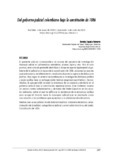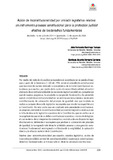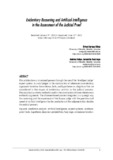On the Colombian Judicial Government Under the Constitution of 1886
Del gobierno judicial colombiano bajo la constitución de 1886
Compartir este ítem
Fecha
2021-03-24Autor
Zapata Romero, Sergio Andrés
Citación
Metadatos
Mostrar el registro completo del ítemDocumentos PDF
Resumen
This article corresponds to an advance of the research project "Judicial autarchy in Latin America: background, scope, achievements and challenges" which for the specific case aims to identify the way in which the judicial government was implemented within the framework of the 1886 constitution; as well as the reasons that motivated its establishment and evolution during the validity of said political Charter; to achieve this, historical-legal and socio-legal research were combined, under a mixed (theoretical-empirical) quantitative and hermeneutical approach, that allowed concluding the existence of an authoritarian substratum in the judicial government under the regenerationist constitution, which imposed a harmful administrative and guardianship control of the executive in judicial affairs, on which the resistance of the legal structure to hosting transit would be built, towards the judicial autarchy that was proposed as a solution to the problems that affected the administration of justice. El presente artículo corresponde a un avance del proyecto de investigación Autarquía judicial en Latinoamérica: antecedentes, alcances, logros y retos. Para el caso puntual, este artículo pretende identificar la forma en que se implementó el gobierno de lo judicial en el marco de la constitución de 1886, así como las razones que motivaron su establecimiento y evolución durante la vigencia de dicha carta política. Para lograr lo anterior se combinaron la investigación histórico-jurídica y socio-jurídica bajo un enfoque mixto (teórico-empírico) cuantitativo y hermenéutico, lo que permitió concluir la existencia de un sustrato autoritario en el gobierno judicial bajo la constitución regeneracionista. Este Gobierno impuso un nocivo control administrativo y de tutela del Poder Ejecutivo en los asuntos judiciales, sobre el cual se edificaría la resistencia de la estructura jurídica para acoger el tránsito hacia la autarquía judicial que se planteaba como una solución a los problemas que aquejaban a la administración de justicia.
Colecciones
Excepto si se señala otra cosa, la licencia del ítem se describe como Attribution-NonCommercial-ShareAlike 4.0 International
Ítems relacionados
Mostrando ítems relacionados por Título, Autor o Palabra clave.
-
Naturaleza jurídica de los reglamentos de ley marco, y su control judicial
Restrepo Yepes, Juan Diego; Restrepo-Yepes, Olga Cecilia (Universidad de MedellínFacultad de DerechoMedellín, 2017-12-31)Se ha discutido en la jurisprudencia sobre la naturaleza jurídica de los reglamentos de ley marco, mas el debate no debe considerarse superado, mientras en razón de sus especiales características sigan existiendo argumentos ... -
Action of Unconstitutionality by Relative Legislative Omission: a Constitutional Procedural Instrument for the Effective Judicial Protection of the Fundamental Rights
Restrepo Tamayo, John Fernando; Vergara Cardona, Santiago Aicardo (Universidad de MedellínFacultad de DerechoMedellín, 2020-09-23)Through the constitutional jurisprudential analysis method it can be said that based on the C-108 Sentence of 1994, there is a constitutional precedent that recognizes in a reiterated way the competence of the Colombian ... -
Evidentiary Reasoning and Artificial Intelligence in the Assessment of the Judicial Proof
Vargas, Orión; Jaramillo Restrepo, Andrés Felipe (MedellínUniversidad de MedellínFacultad de Derecho, 2022-12-06)This article shows a structured process through the use of the Intelligent Judge expert system, to assist judges in the construction of inferences or evidentiary arguments based on the evidence, facts, and hypotheses or ...




